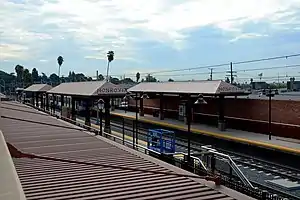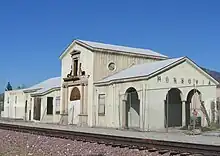Monrovia station
Monrovia station is an at-grade light rail station on the A Line of the Los Angeles Metro Rail system. It is located at the intersection of Duarte Road and Myrtle Avenue in Monrovia, California, after which the station is named. This station opened on March 5, 2016, as part of Phase 2A of the Gold Line Foothill Extension Project.[3][4]
Monrovia | |||||||||||||
|---|---|---|---|---|---|---|---|---|---|---|---|---|---|
 Monrovia station platform | |||||||||||||
| General information | |||||||||||||
| Location | 1641 South Primrose Avenue Monrovia, California | ||||||||||||
| Coordinates | 34°07′59″N 118°00′12″W | ||||||||||||
| Owned by | Los Angeles County Metropolitan Transportation Authority | ||||||||||||
| Platforms | 2 side platforms | ||||||||||||
| Tracks | 2 | ||||||||||||
| Connections | Foothill Transit | ||||||||||||
| Construction | |||||||||||||
| Structure type | At-grade | ||||||||||||
| Parking | 350 spaces[1] | ||||||||||||
| Bicycle facilities | Racks and lockers[2] | ||||||||||||
| Accessible | Yes | ||||||||||||
| History | |||||||||||||
| Opened | 1886 | ||||||||||||
| Rebuilt | 1926, 2016[3] | ||||||||||||
| Services | |||||||||||||
| |||||||||||||
| |||||||||||||
| Location | |||||||||||||
History
The Los Angeles and San Gabriel Valley Railroad built the first train tracks and station in Monrovia in 1887. The Los Angeles and San Gabriel Valley Railroad was founded in 1883, by James F. Crank with the goal of bringing a rail line to San Gabriel Valley from downtown Los Angeles. Los Angeles and San Gabriel Valley Railroad was sold on May 20, 1887 into the California Central Railway. In 1889 this was consolidated into Southern California Railway Company. On January 17, 1906 Southern California Railway was sold to the Atchison, Topeka and Santa Fe Railway and designated the Pasadena Subdivision.
Installed in 1887, a mule-drawn railway with a single passenger car, called the Myrtle Avenue Railroad[5] at that time ran from the Monrovia station up Myrtle Ave to downtown Monrovia. On the way back down to the rail station, the mule was loaded onto a flatcar and downhill gravity took the cars back to the station. By the early 1920s the partially mule-powered streetcar system was removed. In 1906 the first Pacific Electric rail car arrived in Monrovia. The PE Pasadena and Monrovia line ended in 1951. Santa Fe Middle School near the station is named after the Santa Fe Railway.[6]

The current railway station reuses the former Atchison, Topeka and Santa Fe Railway depot which was built in 1926. It is designed in a Spanish colonial revival style.[7] The 1926 station replaced a wooden depot built on the site in 1886 by the original Los Angeles and San Gabriel Valley Railroad. Santa Fe and later Amtrak ran the Southwest Chief and Desert Wind over this line in Monrovia, but rerouted passenger trains to the Fullerton Line in 1986. The Santa Fe line served the San Gabriel Valley until 1994, when the 1994 Northridge earthquake weakened the bridge in Arcadia. With the completion of the Gold Line in Monrovia, the 1926-era Monrovia train station is slated to be restored.[8][9][10][11]
The Santa Fe Depot was used in a number of Hollywood movies through the years. It is used two times in the 1966 movie The Trouble with Angels, both at the start and the ending in which the girls leave St. Francis Academy.[12]
Vehicle maintenance facility
As part of the light rail extension, the Gold Line Authority and Metro built a new Maintenance and Operations (M&O) Facility in Monrovia, east of Monrovia station. The 27-acre (11 ha) facility services, cleans and stores light rail vehicles for Metro's fleet, with a total storage capacity of 104 vehicles. The facility, known as Metro Division 24 Yard, is located just north of the right of way between California Avenue and Shamrock Avenue. It cost $53 million to build.[13]
Service
Station layout
| Side platform, doors will open on the right | |||
| Westbound | ← | ||
| Eastbound | | ||
| Side platform, doors will open on the right | |||
Hours and frequency
A Line trains run every day between approximately 4:30 a.m. and 11:30 p.m. Trains operate every 10 minutes during peak hours Monday through Friday, and every twelve minutes during the daytime on weekdays and all day on the weekends. Evening service (after 7 p.m.) is every 20 minutes.[14]
Neighborhood and destinations
The city of Monrovia created a transit-oriented district around the station. The district, known as the Station Square Transit Village Mixed Use District, has mixed retail, residential and office uses, with pedestrian amenities and connections. Construction of phase one of the new district started in 2017. Between the station and the I-210 Foothill Freeway is the Station Square Transit Center, with a park and parking lot, also new apartment buildings.[16] Plans are to restore/renovate the historic 1926 Monrovia Santa Fe train station depot at the location, though the actual use of the station is not yet determined as of 2013.[17][18][19]
References
- "Metro Parking Lots by Line". Los Angeles County Metropolitan Transportation Authority. Archived from the original on August 10, 2020. Retrieved November 5, 2021.
- "Secure Bike Parking on Metro" (PDF). Los Angeles County Metropolitan Transportation Authority. Archived from the original (PDF) on September 6, 2021. Retrieved November 5, 2021.
- Nelson, Laura J. (March 5, 2016). "Metro Gold Line extension tests San Gabriel Valley's support for transit". Los Angeles Times. Archived from the original on February 18, 2018. Retrieved March 6, 2016.
- Foothill Extension Archived April 28, 2010, at the Wayback Machine.
 Metro (LACMTA)
Metro (LACMTA) - M P Heritage (March 25, 2014). "Myrtle Avenue Railroad, Mules Did What Now?". Archived from the original on July 14, 2014. Retrieved June 12, 2014.

- Hormann, Matt (November 29, 2010). "A Future Gold Line Station: Once an Elegant Stop on the Santa Fe Line". Monrovia Patch. Archived from the original on July 14, 2014. Retrieved June 12, 2014.
- Haugaard, Brad. "Santa Fe train at the old Monrovia train station". monrovianow.com. Monrovia Now. Archived from the original on July 26, 2014. Retrieved June 12, 2014.
An historic picture of a Santa Fe train at the old Monrovia train station. Posted by Bill Mohr on Facebook.
- Mowad, Michelle (May 5, 2014). "San Gabriel Valley Railroad train crossing the Arroyo Seco into Pasadena just north of Garvanza in Highland Park – 1887". Yahoo News. Archived from the original on March 5, 2016. Retrieved July 14, 2017.
- "Alosta: Latest Notes From the New Azusa Town". Los Angeles Times. April 29, 1887. ProQuest 163388146. Archived from the original on March 23, 2023. Retrieved July 25, 2019.

- Los Angeles and San Gabriel Valley Railroad Stock certificate Archived March 4, 2016, at the Wayback Machine
- "Monrovias historic Santa-Fe-depot restoration". www.monroviaweekly.com. Archived from the original on March 5, 2018. Retrieved January 24, 2018.
- Lindsay (October 20, 2014). "Santa Fe Depot from "The Trouble with Angels"". Archived from the original on May 29, 2017. Retrieved July 15, 2017.
- "SGV Tribune, Monrovia's Gold Line maintenance yard work in full swing, By Brenda Gazzar, Staff Writer, 01/03/13". Archived from the original on July 30, 2014. Retrieved June 12, 2014.
- "Metro A Line schedule". Los Angeles County Metropolitan Transportation Authority. June 16, 2023. Retrieved June 12, 2023.
- "A Line Timetable – Connections section" (PDF). Los Angeles County Metropolitan Transportation Authority. June 16, 2023. p. 2. Retrieved June 17, 2023.
- "City of Monrovia web page, Gold line". Archived from the original on May 28, 2014. Retrieved June 12, 2014.
- "monrovianow.com, Planned apartments at Monrovia train station, March 2014". Archived from the original on August 12, 2014. Retrieved June 12, 2014.
- "thesource.metro.net, Planning underway for Monrovia's Station Square at new Gold Line stop, November 14, 2013 by Steve Hymo". November 14, 2013. Archived from the original on August 7, 2014. Retrieved June 12, 2014.
- "Art of the Journey, The Foothill Gold Line" (PDF). Foothill Gold Line Construction Authority. Archived (PDF) from the original on August 24, 2016. Retrieved August 24, 2014.